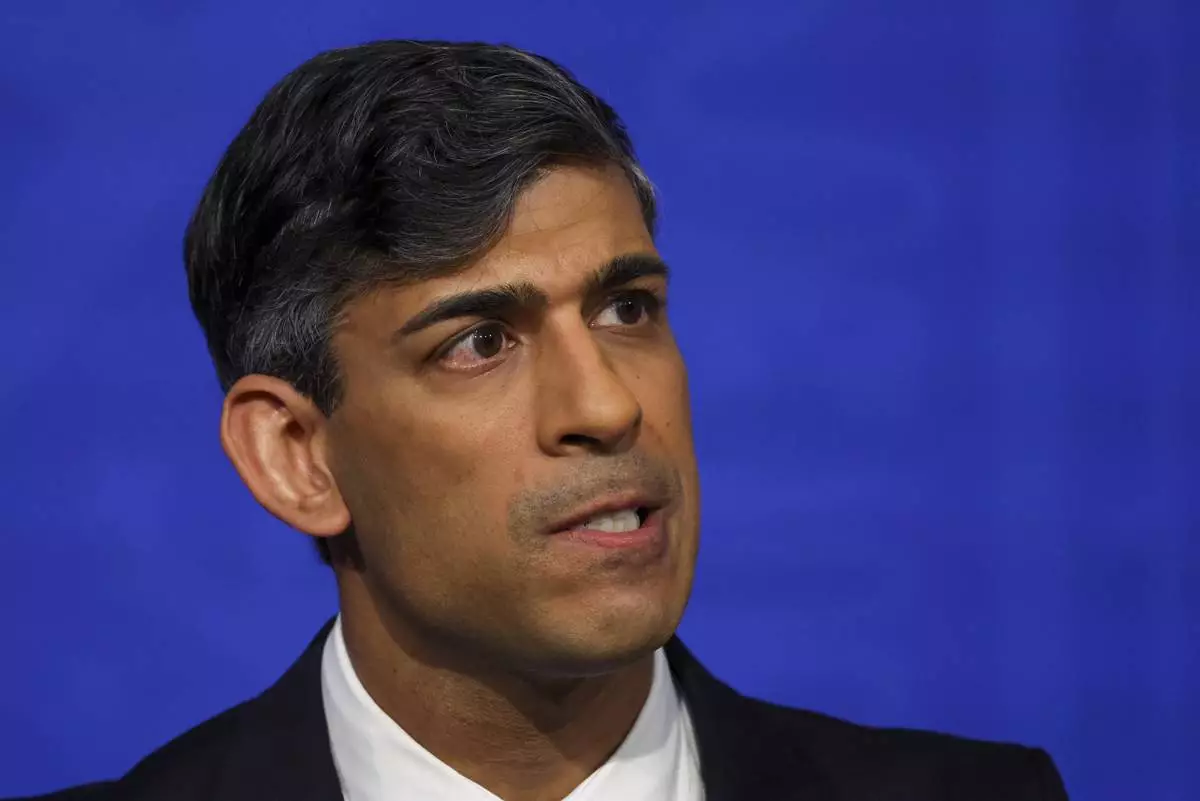John Meighan had a dream.
A property manager and fan of the soccer team Tottenham Hotspur, he envisioned a group bringing together working-class people who felt excluded from political influence — to stand up in opposition, not to Muslims or Islam, but to extremism. They would be people like himself, fans with a passion for their teams and, in many cases, a fondness for a fight. He would cajole them to set aside team rivalries, put down their fists and march through London as an expression of anger and defiance against zealotry.
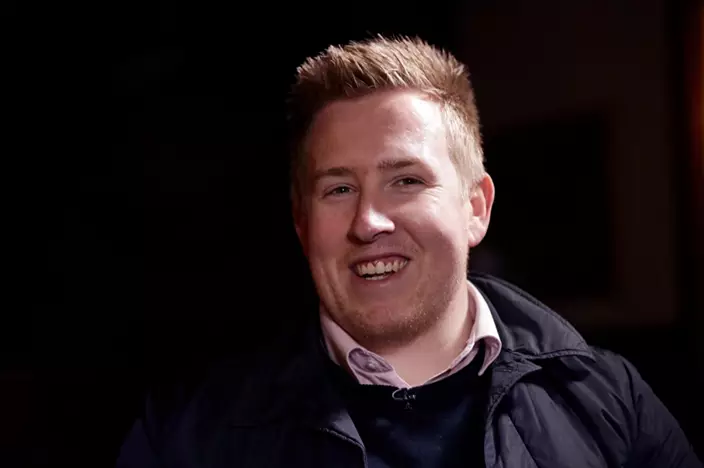
In this photo taken on Wednesday, March 21, 2018, Football Lads Alliance leader John Meighan poses for photographs before giving an interview with The Associated Press in a pub in London. (AP Photo/Matt Dunham)
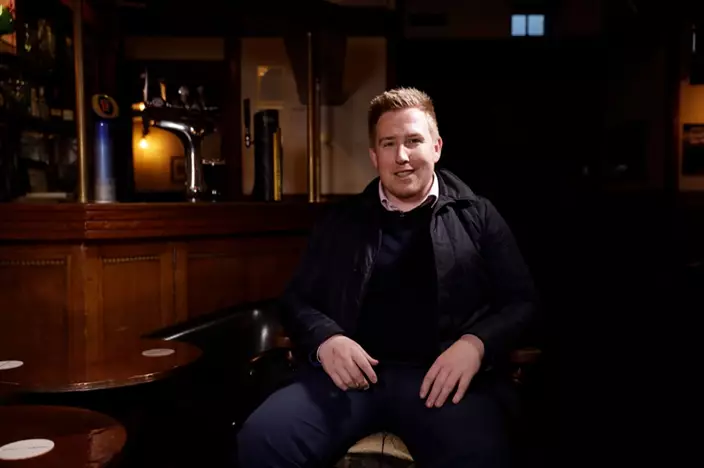
In this photo taken on Wednesday, March 21, 2018, Football Lads Alliance leader John Meighan poses for a photograph before giving an interview with The Associated Press in a pub in London. (AP Photo/Matt Dunham)
At the first demonstration of Meighan's Football Lads Alliance, 10,000 people marched to protest several bloody weeks in which Islamic extremists had attacked British cities with vehicles, knives and a bomb — the deadliest assaults on the nation in more than a decade.
The FLA drew little notice. But several months later, a second Football Lads march swelled to 50,000 demonstrators, and Tommy Robinson was among them. A seasoned anti-Muslim street agitator and far-right media star, he filmed himself praising the group as standing "against Islam."
"I think we're seeing the birth today of a huge organization in the U.K.," Robinson predicted.
And so Meighan's dream began to lose its luster. His group — formed during a particularly fractured time in British politics and society — soon was yanked into the orbit of the far-right. Its members-only Facebook page grew to 65,000 members, some of whom shared anti-Muslim, anti-Semitic and racist cartoons and posts attacking Barack Obama, Nelson Mandela and London's Muslim mayor, Sadiq Khan.
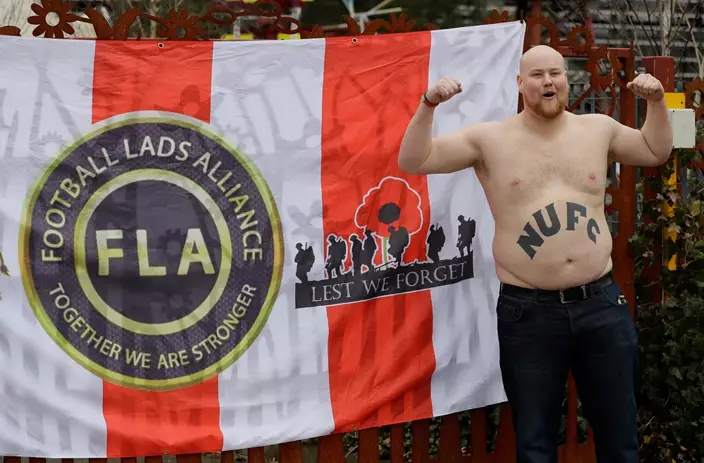
In this photo taken on Saturday, March 24, 2018, a football fan poses with a flag ahead of the Football Lads Alliance (FLA) march in Birmingham, England. (AP Photo/Kirsty Wigglesworth)
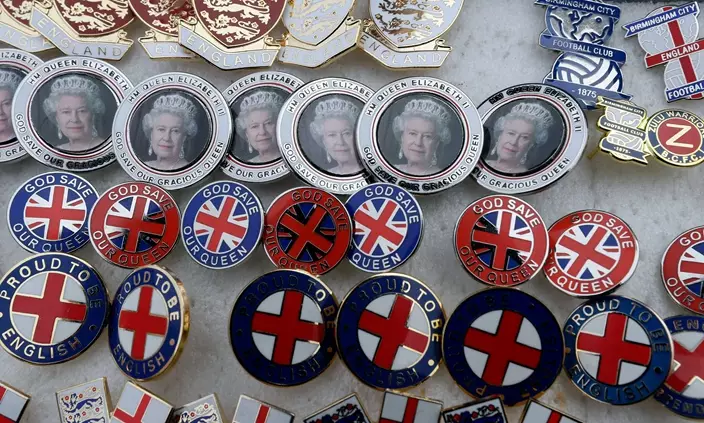
In this photo taken on Saturday, March 24, 2018, a selection of badges are displayed for sale ahead of the Football Lads Alliance (FLA) march in Birmingham, England. (AP Photo/Kirsty Wigglesworth)
The FLA emerged during an unstable time, not long after Britain's 2016 vote to leave the European Union, which was fueled by concerns about immigration and a sense Britain had lost control of its borders. The group's aims, supposedly directed against extremism, dovetailed with the ideas of the country's growing far-right culture — a potent mix of nationalism, anti-Muslim prejudice and conspiracy theories that thrives online.
The far right was energized by the brutal attacks that hit Britain in the spring of 2017. In March, a Muslim convert mowed down pedestrians on Westminster Bridge before stabbing a police officer to death outside Parliament. In May, a Libyan-British suicide bomber attacked crowds leaving an Ariana Grande concert in Manchester, killing 22 people, many of them teenage girls. Two weeks later, three young men inspired by the Islamic State group killed eight people by driving a rented van into pedestrians crossing London Bridge and then attacking passers-by with knives.
That bloodshed had been the final straw for Meighan, a soft-spoken, red-haired man who likes to wear Lacoste sweaters, button-down shirts, tartan scarves and tweed caps — uniform of the clothes-conscious brand of football fan known as a "casual."
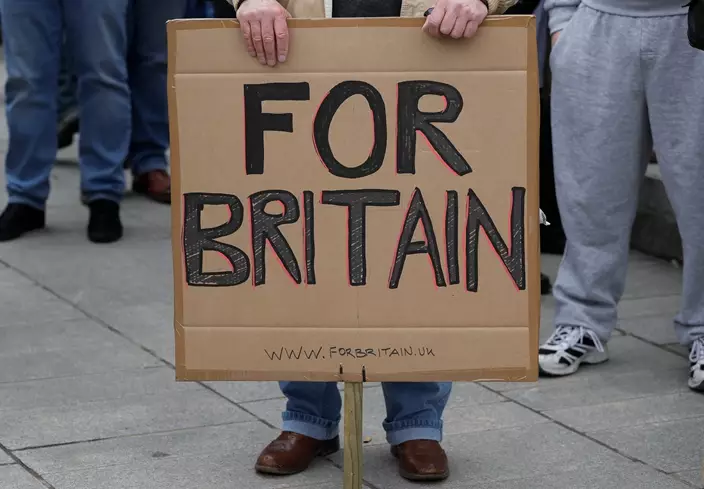
In this photo taken on Saturday, March 24, 2018, a man holds a sign ahead of the Football Lads Alliance (FLA) march in Birmingham, England. A property manager and fan of the soccer team Tottenham Hotspur, John Meighan envisioned a group bringing together working-class people who felt excluded from political influence _ to stand up in opposition, not to Muslims or Islam, but to extremism. It didn’t quite work out that way, as the Football Lads Alliance found itself drawn into the orbit of Britain’s growing far-right. (AP Photo/Kirsty Wigglesworth)
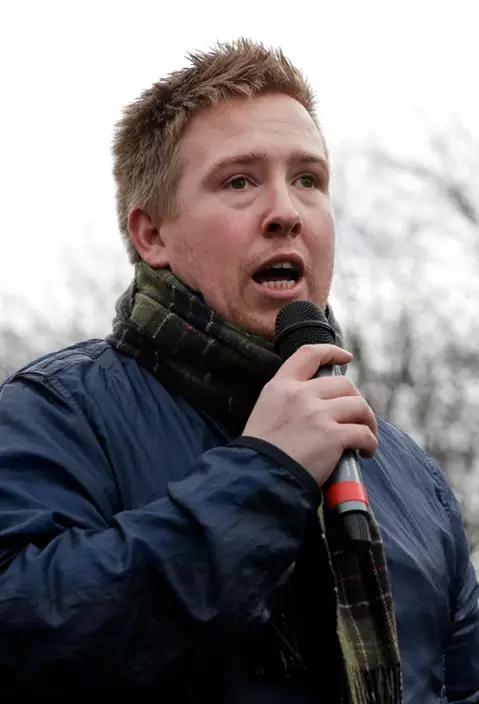
In this photo taken on Saturday, March 24, 2018, John Meighan, founder of the Football Lads Alliance (FLA) speaks ahead of their march in Birmingham, England. A property manager and fan of the soccer team Tottenham Hotspur, Meighan envisioned a group bringing together working-class people who felt excluded from political influence _ to stand up in opposition, not to Muslims or Islam, but to extremism. It didn’t quite work out that way, as the Football Lads Alliance found itself drawn into the orbit of Britain’s growing far-right. (AP Photo/Kirsty Wigglesworth)
He once ran with Tottenham's hooligan "firm" and was banned for a stretch from stadiums across Britain. Now, he is a 33-year-old father of three with anxiety about the world around him.
"My daughters, after London Bridge, decided they didn't want to go to a concert because they were too scared," he told The Associated Press.
Within three weeks of forming, the Football Lads Alliance had 30,000 Facebook members. Thousands pledged to march from St. Paul's Cathedral to London Bridge, three weeks after the attack there.
As Meighan watched the crowds of fans from rival teams gather on that overcast Sunday in June, he was apprehensive — not so much about extremists or left-wing counter-protesters but about the assembled football hooligans, from firms with deep and bitter rivalries, such as Tottenham and Arsenal, or Manchester United and Manchester City.
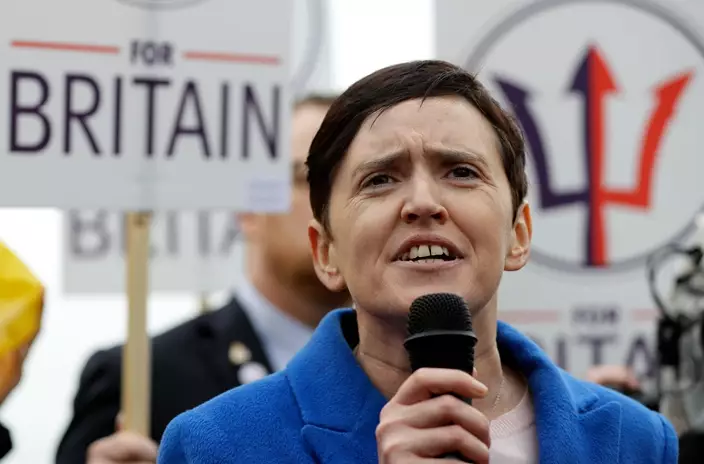
In this photo taken on Saturday, March 24, 2018, Anne Marie Waters, founder and leader of the far-right party For Britain, speaks ahead of the Football Lads Alliance (FLA) march in Birmingham, England. (AP Photo/Kirsty Wigglesworth)
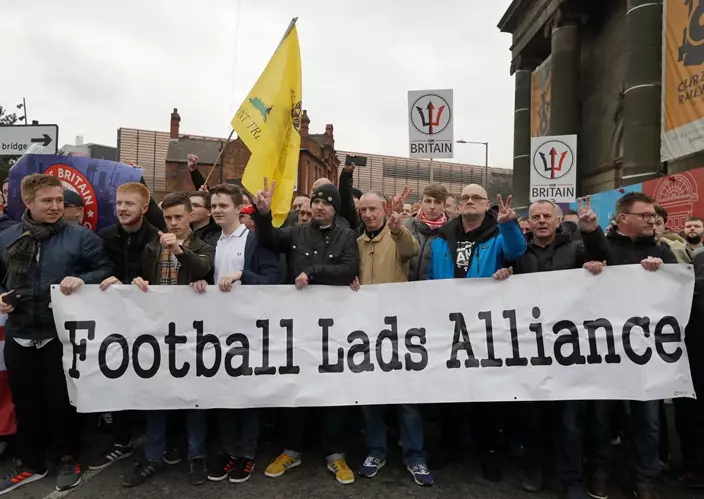
In this photo taken on Saturday, March 24, 2018, John Meighan, far left, founder of the Football Lads Alliance (FLA), takes part in their protest march in Birmingham, England. (AP Photo/Kirsty Wigglesworth)
"Some of these individuals were probably at war with one another and over the years, fought one another," Meighan said. "I thought, I'm walking into the lion's den here."
But his worries were unfounded. The mood was calm and determined as the thousands of football supporters walked the narrow streets of London's financial district to lay wreaths in team colors on London Bridge.
The group had barred flag-waving, chanting and pre-march drinking — for many, essential parts of football fandom. "We didn't want to be stereotyped," Meighan said.
He saw the peaceful march as a vindication, proof that often-maligned football fans could have a voice — could do something, "rather than beating the crap out of one another."
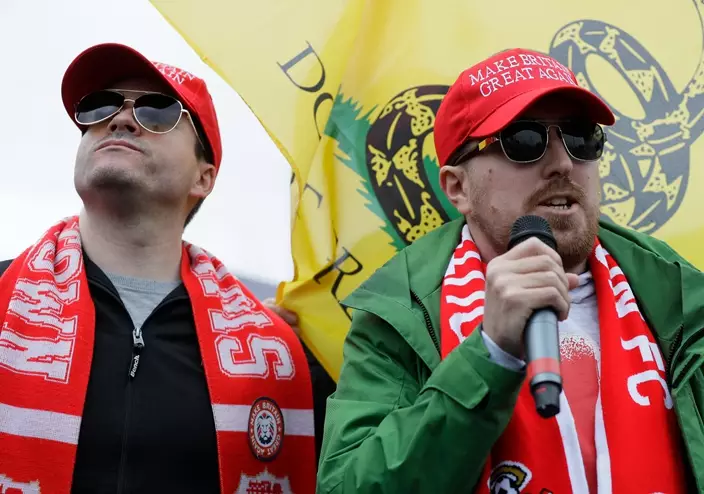
In this photo taken on Saturday, March 24, 2018, Luke Nash-Jones of the Make Britain Great Again group, right, speaks on stage ahead of the Football Lads Alliance (FLA) march in Birmingham, England. (AP Photo/Kirsty Wigglesworth)
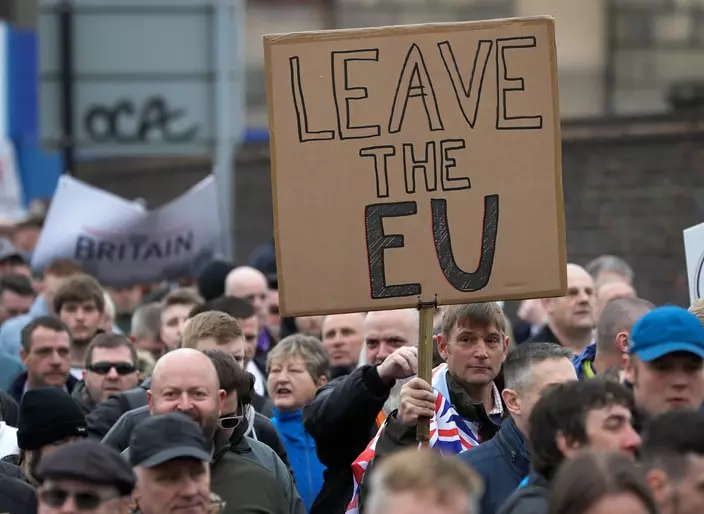
In this photo taken on Saturday, March 24, 2018, people hold banners during the Football Lads Alliance (FLA) march in Birmingham, England. (AP Photo/Kirsty Wigglesworth)
At first, the FLA claimed to be "inclusive and acceptable to all colors, creeds, faiths and religions," and laid out deliberately broad goals. Its website spoke of "making a safer environment and community for all of our children and grandchildren," and its proposals sounded modest — tougher police action, better intelligence, curbs on hate preachers, more controls on terrorism suspects.
Meighan said racists were "moderated out" of its Facebook group.
Hope Not Hate, a group that monitors the far right, said the FLA initially "made a genuine attempt to ensure that it was not a racist group and tried to focus on Islamist extremists, rather than Islam in general."
But clouds were gathering. Mingling with the football fans for the group's second London march in October were alt-right bloggers and far-right activists eager to push it in a more extreme direction.
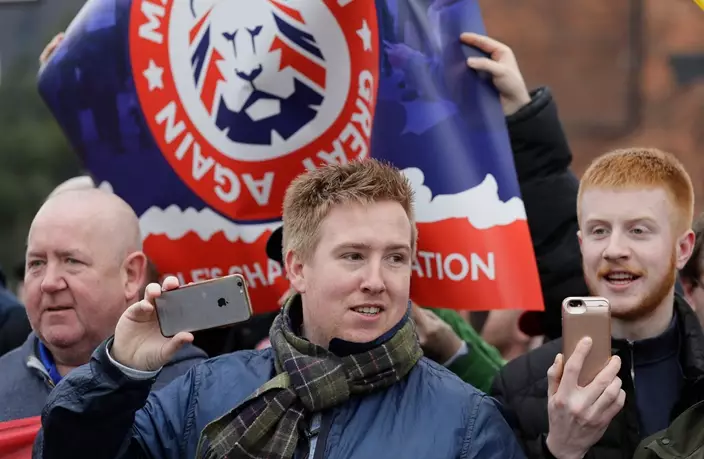
In this photo taken on Saturday, March 24, 2018, John Meighan, centre, founder of the Football Lads Alliance (FLA) takes part in their protest march in Birmingham, England. (AP Photo/Kirsty Wigglesworth)
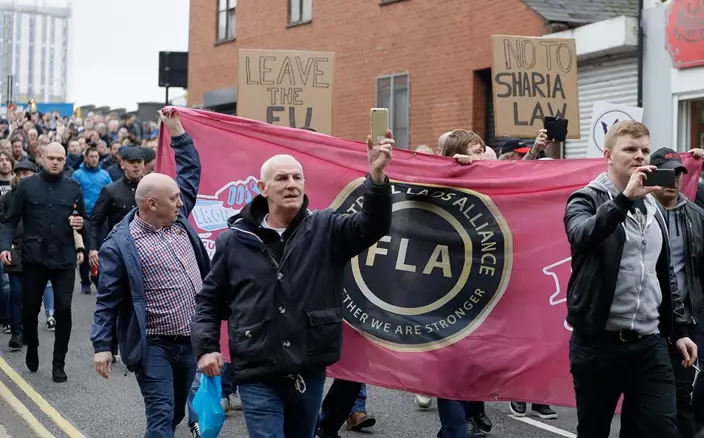
In this photo taken on Saturday, March 24, 2018, people hold banners during the Football Lads Alliance (FLA) march in Birmingham, England. (AP Photo/Kirsty Wigglesworth)
The most influential was Robinson, a 35-year-old former tanning shop owner whose real name is Stephen Lennon. Robinson, who has convictions for assault, football hooliganism and fraud, has lent Britain's far right an energy and media savvy that it often has lacked. He is the former leader of the English Defence League, which became notorious for protests in Muslim neighborhoods and outside mosques that often turned violent.
These days, he is a self-described "journalist, activist and public figure" whose YouTube channel has accumulated more than 6 million views. Recent videos purport to show him fighting migrants in Italy and being attacked by masked men outside a London McDonalds.
When he shows up at demonstrations, fans sing his name: "Oh, Tommy, Tommy!"
Meighan certainly was impressed, calling Robinson "a brave man" who "talks a lot of sense" and urging members of his alliance to attend Robinson events.
On the FLA's Facebook page, post after post began to describe Britain as under threat from uncontrolled immigration or menaced by "grooming gangs" of Muslim men sexually exploiting teenage girls across Britain — a narrative driven by trials in several British cities in which men of mostly Pakistani origin were convicted of coercing girls and women into sex.
Still, Meighan denied the FLA was a far-right group. "It's not about Muslim people in general," he said. "There are moderate Muslims. There are people I know that are good people."
But, he added: "There is part of Islam that is evil."
Like many on the far right, he also spoke as if society was poised on the brink of disintegration, saying more terrorist attacks could spur a "civil war."
Meighan, whose father is an immigrant from Ireland, lives in a multicultural London neighborhood with a large Muslim population, where traditional pubs stand near Middle Eastern restaurants and public housing estates mix with the pricey homes of wealthy professionals.
The area — and the city surrounding it — have both changed enormously in the last few decades, and not everyone is happy about it.
Meighan describes FLA supporters as "just fed up. ... People who've got children and grandchildren, who've grown up in society how it was, and how it is now, and who feel threatened by it."
For the far-right, that threat comes from Islam, which it paints as a menace to Western civilization. It's a message that spreads rapidly on social media, where diverse figures including Robinson, North American "alt-right" ideologues and the German white nationalists Generation Identity repost and reinforce one another's opinions and images.
Despite that unity of message, Britain's far right is riven by factionalism. As the FLA moved into the whirlpool of online far-right radicalism, it also began to fracture. Egos clashed, members bickered online, and some broke off to form the rival Democratic Football Lads Alliance.
Meanwhile, Meighan prepared to test the FLA's popularity outside of London with a march in Birmingham, England's second-largest city.
The crowd that gathered that day in March was much smaller than those in London — a couple of thousand people at best. The politics were sharper and harder, with speakers dwelling on the obsessions of the far right in 2018: immigration, Islam and an alleged threat to white Christian identity.
Tommy Robinson was there, muscling through the crowd with an entourage while fans leaned in to get selfies. The star speaker was Anne Marie Waters, leader of the anti-immigrant party For Britain, who said Islam was bringing "poison" into the country and that the EU, by letting in migrants, had imported "hell on Earth" to Europe.
Meighan called Waters' speech "inspirational."
"I think we potentially could have someone who's going to stand up for what's right for this country, stand up for us," he said.
Meighan had told the crowd the movement he had launched was "going viral," but he was more subdued at the end of the march. "I don't know if my heart is in it," he admitted.
A few weeks later, he shocked supporters by quitting, saying he wanted to focus on work and his family. He still posts on social media — attacks on liberals and left-wing politicians, and complaints that critics of Islam such as Robinson are being silenced.
He's far from alone. Far-right ideas are spreading, and so, say British police, is the threat of far-right violence. Britain saw a deadly van attack against Muslims in London in 2017, and detectives say four other plots were foiled in the year leading up to March.
Robinson can draw large crowds for his anti-Islam rants, and boasted recently: "We're now mainstream." In May, he was sentenced to 13 months in prison for contempt of court for livestreaming outside a trial in violation of strict British court reporting rules — a sentence that has only boosted his profile among the international far right.
The Football Lads Alliance declared it would soldier on without its founder and gathered in Manchester on May 19 to mark the anniversary of the arena bombing.
It was a decidedly depleted organization that assembled in the spring sunshine. Just a few hundred people showed up, on a day when millions of Britons were tuning into the royal wedding of Prince Harry and Meghan Markle. To add to the indignity, police wouldn't even let the group march. The attendees stood listening to speeches, then went off to the pub.
"R.I.P. the FLA," one supporter posted on Facebook.



